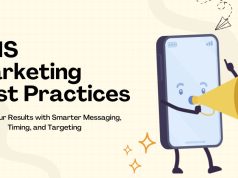SMS marketing campaigns have become one of the most powerful tools for businesses to reach customers directly. With an average open rate of 98%, text message marketing delivers results that email campaigns can only dream of achieving.
But what exactly is an SMS marketing campaign, and how can your business harness its potential? This comprehensive guide will walk you through everything you need to know about SMS marketing campaigns, from basic concepts to advanced strategies that drive real results.
Understanding SMS Marketing Campaigns
An SMS marketing campaign is a promotional strategy that uses text messages to communicate with customers and prospects. These campaigns involve sending targeted messages to a list of subscribers who have opted in to receive communications from your business.
Unlike other marketing channels, SMS marketing campaigns deliver messages directly to customers’ mobile phones. This creates an immediate, personal connection that’s hard to ignore. Most people check their phones within minutes of receiving a text message, making SMS campaigns incredibly effective for time-sensitive promotions and important announcements.
SMS marketing campaigns can serve various purposes. Some businesses use them to announce sales and special offers. Others send appointment reminders, shipping notifications, or customer service updates. The versatility of SMS marketing makes it suitable for almost any industry or business size.
Types of SMS Marketing Campaigns
Promotional SMS Campaigns
Promotional campaigns focus on driving sales and increasing revenue. These messages typically include discount codes, flash sales, new product announcements, or exclusive offers for subscribers. The key to successful promotional SMS campaigns is creating urgency while providing genuine value to your audience.
Transactional SMS Campaigns
Transactional messages provide important information related to customer purchases or account activities. Examples include order confirmations, shipping updates, appointment reminders, and password reset notifications. These campaigns often have higher engagement rates because customers expect and want to receive this information.
Informational SMS Campaigns
Informational campaigns keep customers updated about your business without necessarily promoting specific products or services. These might include company news, event announcements, helpful tips, or industry insights. While they don’t directly drive sales, informational campaigns help build stronger customer relationships.
Key Components of Successful SMS Marketing Campaigns

Building Your Subscriber List
The foundation of any SMS marketing campaign is a quality subscriber list. Unlike email marketing, you cannot purchase SMS contact lists. Customers must explicitly opt in to receive text messages from your business. This requirement actually works in your favor, as it ensures you’re reaching people who are genuinely interested in your brand.
Common opt-in methods include website forms, social media campaigns, in-store signups, and keyword-based subscriptions. For example, customers might text a specific keyword to your business number to join your SMS list and receive a welcome discount.
Crafting Compelling Messages
SMS messages have a 160-character limit, so every word counts. Successful SMS marketing campaigns use clear, concise language that immediately communicates value. Your message should include a clear call-to-action that tells recipients exactly what you want them to do.
Personalization significantly improves SMS campaign performance. Using customers’ names and referencing their purchase history or preferences makes messages feel more relevant and engaging. Many SMS marketing platforms offer personalization features that automatically customize messages for each recipient.
Timing Your Messages
Timing plays a crucial role in SMS marketing campaign success. Sending messages at the right time can dramatically improve open rates and conversions. Generally, weekday afternoons and early evenings perform well, but the optimal timing depends on your audience and industry.
Consider your customers’ time zones when scheduling campaigns. Sending messages too early or too late can annoy recipients and increase unsubscribe rates. Most SMS marketing platforms allow you to schedule messages for optimal delivery times across different regions.
Benefits of SMS Marketing Campaigns

High Open Rates
SMS marketing campaigns boast exceptionally high open rates compared to other marketing channels. While email open rates typically hover around 20-25%, SMS messages achieve open rates of 98% or higher. This means nearly every message you send will be seen by your audience.
Immediate Delivery
Text messages are delivered instantly, making SMS marketing campaigns perfect for time-sensitive promotions or urgent communications. Customers typically read SMS messages within minutes of receiving them, enabling real-time engagement with your audience.
Cost-Effective Marketing
SMS marketing campaigns offer excellent return on investment. The cost per message is typically low, especially when compared to traditional advertising methods. Even small businesses can afford to run comprehensive SMS marketing campaigns without breaking their marketing budget.
Direct Communication Channel
SMS creates a direct line of communication between your business and customers. Unlike social media posts or email campaigns that might get lost in crowded inboxes, text messages appear prominently on customers’ phones and demand immediate attention.
Best Practices for SMS Marketing Campaigns
Obtain Proper Consent
Always ensure you have explicit consent before adding customers to your SMS marketing list. This isn’t just good practice—it’s legally required in many jurisdictions. Include clear opt-in language and provide easy instructions for unsubscribing from your campaigns.
Provide Value in Every Message
Each SMS in your marketing campaign should offer clear value to recipients. Whether it’s a discount, useful information, or an exclusive offer, customers should benefit from receiving your messages. Avoid sending messages just to maintain contact—this approach often backfires and increases unsubscribe rates.
Maintain Consistent Branding
Your SMS marketing campaigns should reflect your brand voice and personality. Consistent messaging across all channels helps build brand recognition and trust. If your brand is playful and casual, your SMS messages should reflect that tone. If you’re a professional service provider, maintain a more formal approach.
Monitor and Optimize Performance
Track key metrics like delivery rates, open rates, click-through rates, and conversion rates for your SMS marketing campaigns. Use this data to optimize future campaigns and improve overall performance. A/B testing different message formats, timing, and calls-to-action can help you identify what works best for your audience.
Common SMS Marketing Campaign Mistakes to Avoid

Sending Too Many Messages
Frequency is crucial in SMS marketing campaigns. Sending too many messages can quickly annoy customers and lead to high unsubscribe rates. Most businesses find success with 1-4 messages per month, though this varies by industry and audience preferences.
Ignoring Compliance Requirements
SMS marketing is heavily regulated in many countries. Familiarize yourself with relevant laws and regulations, including requirements for opt-in consent, unsubscribe options, and sending time restrictions. Non-compliance can result in significant fines and damage to your business reputation.
Neglecting Mobile Optimization
While SMS messages are inherently mobile-friendly, any links in your campaigns should lead to mobile-optimized landing pages. If customers click through to your website and find a poor mobile experience, your SMS marketing campaign efforts will be wasted.
Getting Started with Your SMS Marketing Campaign
Choose the Right Platform
Select an SMS marketing platform that fits your business needs and budget. Look for features like automation, personalization, analytics, and integration with your existing marketing tools. Popular platforms include Twilio, SimpleTexting, and EZ Texting.
Define Your Campaign Goals
Before launching your first SMS marketing campaign, clearly define what you want to achieve. Are you looking to increase sales, improve customer engagement, or reduce no-shows for appointments? Having clear goals will help you measure success and optimize your campaigns.
Create a Content Calendar
Plan your SMS marketing campaigns in advance with a content calendar. This helps ensure consistent messaging and prevents you from overwhelming customers with too many messages. Include seasonal promotions, product launches, and regular touchpoints in your calendar.
Transform Your Customer Communication
SMS marketing campaigns offer businesses a powerful way to connect with customers and drive meaningful results. The combination of high open rates, immediate delivery, and direct communication makes SMS an essential part of any comprehensive marketing strategy.
Success with SMS marketing campaigns requires careful planning, consistent execution, and ongoing optimization. Start small, focus on providing value to your subscribers, and gradually expand your campaigns as you learn what works best for your audience.
Ready to launch your first SMS marketing campaign? Begin by choosing a reliable SMS marketing platform and developing a clear strategy for building your subscriber list. With the right approach, SMS marketing can become one of your most effective customer communication channels.
While SMS campaigns offer a direct and cost-effective way to reach customers, integrating them with broader outreach efforts—like Digital PR strategies—can amplify your brand message and build stronger online authority.









